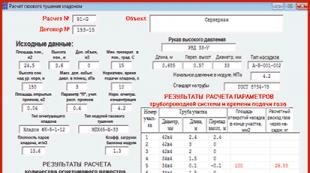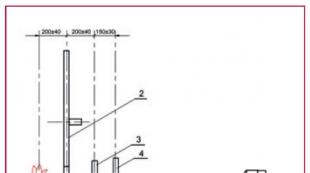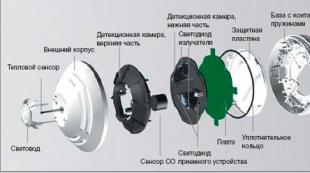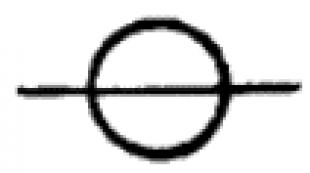Russian federal authorities determine. Federal executive authorities in the Russian Federation: legal status and types
According to the Decree Pres. RF from 08/14/1996, No. 1176 sist. Fed. org Spanish the authorities are the ministries of the Russian Federation (fed. min-va) and other fed. organs sp. authorities (state committees of the Russian Federation, federal commissions of the Russian Federation, federal services of the Russian Federation, Russian agencies, federal supervision of the Russian Federation, as well as Administrative affairs of the Pres. of the Russian Federation) Center. org Spanish authorities operate in economical, social, cultural and administrative political spheres. Fed structure. organs sp. authorities approved by presidential decree. RF dated May 17, 2000 No. 867.
Executive authority - This is an organizational team that carries out executive and administrative activities, endowed with operational autonomy, has a permanent staff, is formed by a higher authority, is accountable and controlled by a higher executive body, the education, structure and activity of which are governed mainly by the norms of adm. rights.
Article 110 of the KRF expressly states that the executive power of the Russian Federation is exercised by the Government of the Russian Federation. The KRF does not establish the criteria by which certain government bodies relate to the executive branch. But one can come to an understanding of this logically if one subtracts from all federal bodies of state power legislative and judicial bodies, as well as bodies with special status (Prosecutor's Office of the Russian Federation, Central Bank of the Russian Federation, Joint Venture of the Russian Federation, CEC). The remaining bodies make up the system of executive bodies, which are today enshrined in the Decree of the President of the Russian Federation "On the structure of federal bodies of IW" No. 867 of 05.17.2000.
In addition, in accordance with Part 2 of Art. Thus, unlike the legislative power of IP in the Russian Federation, it has a single character, which determines the scope of powers of the Government of the Russian Federation (organizes the implementation of laws adopted by the Federal Assembly of the Russian Federation, international treaties; monitors the execution of these acts of the RF OIV and its subjects, takes measures to eliminate violations of the current legislation).
The KRF does not provide for the consolidation of the system of federal executive bodies in federal law, and only in the Federal Law "On the Government of the Russian Federation" such a rule is established. Therefore, such a system is established by decrees of the President of the Russian Federation. The federal executive authority system includes: the Government of the Russian Federation; ministries of the Russian Federation (24); state committees of the Russian Federation (6); federal commissions of Russia (2); federal services of Russia (13); Russian agencies (8); federal supervision of Russia (2); other federal executive bodies (3).
Ministry of the Russian Federation - FOIV, conducting state policy and managing in the established field of activity, as well as coordinating, in cases established by laws, decrees and posts, activities in this area of \u200b\u200bother FOIV. The ministry is headed by the federal minister, a member of the Government of the Russian Federation.
State Committee of the Russian Federation, Federal Commission of the Russian Federation - Federal executive bodies on a collegial basis, carrying out intersectoral coordination on issues related to their jurisdiction, as well as functional regulation in a certain field of activity and headed by the chairman of the Civil Code or FC.
Federal Service of the Russian Federation, Russian Agency, Federal Supervision of the Russian Federation - FOIV, performing special (executive, control, permissive, regulatory, etc.) functions in established areas. The Federal Assembly of the Russian Federation is headed by a head (director), the Republic of Armenia - the general director, the Federal Tax Service - the chief.
The creation of federal executive bodies, their reorganization and liquidation is carried out by the President of the Russian Federation on the proposal of the Prime Minister of the Russian Federation. The regulations on federal executive bodies subordinate to the President of the Russian Federation on issues assigned to him on issues assigned to him by the KRF and laws are approved by the President of the Russian Federation, and on other federal executive bodies by the Government of the Russian Federation. The maximum number and payroll of employees of the central apparatus and territorial bodies of federal executive bodies are approved by the Government of the Russian Federation.
The status of each executive authority corresponds to the procedure for the appointment of its leaders. Thus, federal ministers are appointed and dismissed by the President of the Russian Federation on the proposal of the Prime Minister of the Russian Federation. Deputies of federal ministers are appointed and dismissed by the Government of the Russian Federation or in accordance with laws. The appointment and dismissal of heads of federal executive bodies, except for federal ministers and heads of bodies subordinate to the President of the Russian Federation, is carried out by the Government of the Russian Federation.
The heads of the federal executive bodies subordinate to the President of the Russian Federation on issues assigned to him by the Russian Federation and laws are appointed and dismissed in a specially established manner.
the generalized name of the executive authorities of the Russian Federation, used by the Constitution and other regulatory acts of the Russian Federation. In accordance with the Decree of the President of the Russian Federation "On the System of Federal Executive Bodies" dated August 14, 1996 (with subsequent amendments), the system of these bodies includes the ministries of the Russian Federation (federal ministries) and other federal executive bodies: state committees of the Russian Federation, federal commissions of Russia , federal services of Russia, Russian agencies, federal supervision of Russia, as well as the Office of the President of the Russian Federation.
Ministry of the Russian Federation - F. about. and. century, pursuing state policy, managing in the established field of activity, and also coordinating the activities of other F. about. and. in. The Ministry is headed by the Minister of the Russian Federation (Federal Minister), a member of the Government of the Russian Federation.
The State Committee of the Russian Federation and the Federal Commission of Russia - F. about. and. century., carrying out on a collegial basis intersectoral coordination on issues related to their jurisdiction, as well as functional regulation in a certain field of activity. The State Committee, the federal commission is headed by the chairman.
Federal Service of Russia, Russian Agency, Federal Supervision of Russia - F. about. and. century., performing special (executive, control, licensing, regulatory, etc.) functions in the established areas of competence. The Russian Federal Service is headed by the head (director) of the Russian Federal Service, the Russian Agency is the General Director of the Russian Agency, the Federal Supervision of Russia is the Head of the Federal Supervision of Russia.
Creation of F. about. and. c., their reorganization and liquidation are carried out by the President of the Russian Federation at the proposal of the Chairman of the Government of the Russian Federation.
The Federal Minister is appointed and dismissed by the President of the Russian Federation on the proposal of the Chairman of the Government of the Russian Federation. The chairman of the state committee, the federal commission, the head (director) of the federal service, the general director of the Russian agency and the head of federal supervision are appointed and dismissed by the Government of the Russian Federation.
Thus, the ministries of the Russian Federation, in principle, can be considered to have a higher rank in comparison with other F. o. and. c., since the ministers are appointed by the President of the Russian Federation and are members of the Government of the Russian Federation, and the heads of other bodies are appointed by the Government of the Russian Federation and are not members of it.
However, it should be borne in mind that, by decree of August 14, 1996, the leaders of F. about. and. c., subordinate to the President of the Russian Federation on issues assigned to him by the Constitution and laws of the Russian Federation, are appointed to and dismissed in a specially established manner, i.e., the appointment and dismissal in this case is made by the President of the Russian Federation (see also : State Committee Russian Federation. The Ministry of the Russian Federation. Russian agency. Federal Commission of Russia. Federal Service of Russia. Federal Supervision of Russia). (S. A.)
Excellent definition
Incomplete definition ↓
Federal Executive Bodies
The system of federal executive bodies was established in 2004. It includes federal ministries, federal services and federal agencies. Later, state committees were included in it. Concrete list of full name approved by the President of the Russian Federation in the form of a structure of federal state executive bodies.
The system of federal executive bodies is formed on a scientific basis by dividing several groups of functions. General functions are divided into four main groups: 1) functions for the adoption of regulatory legal acts; 2) control and supervision functions; 3) the functions of managing state property; 4) functions for the provision of public services.
The Federal Ministry is the federal executive body that exercises the functions of formulating state policy and legal regulation in the field of activity established by acts of the President of the Russian Federation and the Government of the Russian Federation. The competence of the ministry is limited by the general principle of subordination, the secondary nature of its acts in accordance with the formula “based on and enforcing”, the Constitution of the Russian Federation, federal constitutional laws, federal laws, acts of the President of the Russian Federation and the Government of the Russian Federation. In the established field of activity, the ministry is not entitled to exercise control and supervision functions, as well as functions to manage state property, except for cases established by decrees of the President of the Russian Federation or resolutions of the Government of the Russian Federation. One of the most important internal tasks of the ministry is connected with the organization of a system of directly subordinate federal authorities, for which it is endowed with coordination and control functions.
The Federal Service is the federal executive body that exercises control and supervision functions in the established field of activity, as well as special functions in the field of defense, state security, defense and protection of the state border of the Russian Federation, the fight against crime, and public safety. The federal service is headed by the head (director) of the federal service. The Federal Service may be subordinate to the President of the Russian Federation or may be administered by the Government of the Russian Federation. The Federal Oversight Service may have the status of a collegial body, and this differs organizationally from bodies operating solely on the basis of the principle of unity of command, i.e. ministries. The Federal Service has the right to issue individual legal acts, and in cases established by decrees of the President of the Russian Federation or resolutions of the Government of the Russian Federation, it has the right to carry out normative legal regulation in the established field of activity.
A federal agency is a federal executive body that exercises functions related to the provision of public services, management of state property and law enforcement functions in the established field of activity, with the exception of the functions of control and supervision. The federal agency is headed by the head (director) of the federal agency. A federal agency may have collegial status. The federal agency may be subordinate to the President of the Russian Federation. The agency issues individual legal acts. It does not have the right to carry out normative legal regulation in the established field of activity and the functions of control and supervision, except for cases established by decrees of the President of the Russian Federation or resolutions of the Government of the Russian Federation.
State Committee as a full name can perform all of the above functions comprehensively, i.e. endowed with the largest amount of competence. The head of the state committee enjoys the rights of the federal minister under the decrees of the President of the Russian Federation and resolutions of the Government of the Russian Federation.
Excellent definition
Incomplete definition ↓
executive authority federal cadastre
As previously mentioned, the types of executive bodies are a system of executive bodies.
The classification of executive bodies is as follows:
1) By federated device:
· Federal executive bodies;
· Executive authorities of the subjects.
2) In terms of competence:
· Bodies of general competence;
· Bodies of special competence;
· Bodies of industry competence;
· Bodies of intra-industry competence;
· Bodies of intersectoral competence;
· Bodies of mixed competence.
3) By organizational and legal forms:
· Governments;
· Councils of ministers with government status;
· Ministries;
· State committees;
· Committees;
· Services;
· Main departments;
· Management;
· Inspections;
· Agencies;
Departments
· Administration;
· Departments;
· Other executive bodies.
4) in order to resolve subordinate issues:
· One-man;
Collegial.
As previously noted, the system and structure of executive authorities are not the same. But these concepts are interconnected. Their development is influenced by many political, social, legal and other factors. Recently, the system of federal executive bodies has often changed. Previously, this system was created on the basis of improving the principle of non-state management of the economic sphere. Decree of the President of the Russian Federation dated 09.03.2004 No. 314 "On the system and structure of federal executive bodies" (SZ RF. 2004. N 11. Article 945) approved a new system of federal executive bodies, which includes federal ministries, federal services and federal agencies. The structure of federal executive bodies includes the Government of the Russian Federation, and an alphabetical list of federal ministries, state committees, federal services, agencies. Types of organs represent a certain set of interacting organs, both within the framework of each species and between them, they cannot act as the structure of the whole (system).
1. Federal ministries are federal executive bodies that carry out the functions of developing state policy and legal regulation in the field of activity established by acts of the President of the Russian Federation and the Government of the Russian Federation. The functions for the adoption of regulatory legal acts are the publication on the basis of and pursuant to the Constitution of the Russian Federation and federal laws binding on public authorities, local authorities, their officials, legal entities and citizens established by the Constitution of the Russian Federation, federal laws and other regulatory legal acts universally binding rules of conduct that apply to an indefinite circle of persons. The ministry is headed by a federal minister who is part of the Government of the Russian Federation. The Ministry in the established field of activity cannot perform the functions of control and supervision, law enforcement functions and the functions of managing state property, except as established by decrees of the President of the Russian Federation.
The essence of federal ministries lies in the implementation of legal regulation in the established field of activity, except for issues the legal regulation of which in accordance with the Constitution of the Russian Federation and legislation is carried out exclusively by federal laws, acts of the President of the Russian Federation and the Government of the Russian Federation.
2. The Federal Service is a federal executive body that exercises control and supervision functions in the established field of activity, as well as special functions in the field of defense, state security, state border protection and protection, the fight against crime, and public safety.
The functions of control and supervision are actions to control and supervise the execution by state authorities, local authorities, their officials, legal entities and citizens established by the Constitution of the Russian Federation, legislation.
Federal services, within their competence, issue individual legal acts on the basis and pursuant to the Constitution of the Russian Federation and federal legislation that coordinates and controls the activities of the service. The Federal Service may be administered by the President of the Russian Federation or be subordinate to the Government of the Russian Federation.
3. Federal agencies are federal executive bodies that carry out the functions of rendering public services, managing state property and law enforcement functions in the established field of activity, with the exception of the functions of control and supervision.
Functions for the provision of public services is the implementation by federal executive bodies of services of exceptional public importance and rendered to an undefined group of people under conditions established by federal law;
Federal agencies, within their competence, issue individual legal acts on the basis and pursuant to the Constitution of the Russian Federation and federal legislation. Thus, the system of federal executive bodies is a legally ordered internally agreed set of bodies that are different in their organizational and legal form, subordinated on the basis of the division of competence between them and forming integrated unity in the process of implementing executive power throughout the Russian Federation.
The diversity of federal executive bodies is determined by the desire for the most effective implementation of the functions of public administration. But it should be noted that there is no law that specifies all the provisions on the executive branch.
At the moment, these provisions are contained in several regulations. The adoption of a single regulatory act will create a stable legal basis for the formation of an effective executive branch, including the system of federal executive bodies.









